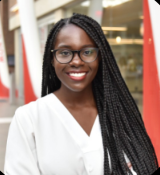
Barbara Brown
Law students wear many hats, and at Osgoode, many students also wear the hat of being community organizers. I had the honour of interviewing 12 JD students about their involvement in various social justice movements and community initiatives this past year. Here is an overview of their work.
Barbara Brown (2L) is Equity Advisor for Osgoode’s Black Law Students’ Association (BLSA) and one of three JD representatives on Osgoode’s Equality Committee. Her community work extends to other community groups on campus. Barbara is passionate about litigation and will be joining Lenczner Slaght as a summer student.
Barbara’s work with BLSA has “revolve[d] around the BLSA recommendations that came out in 2018.” She highlighted three key recommendations.
The first, she said, was to have a 1L session on anti-Black racism. “Deans have been working with a few professors to create a section within the ELGC [Ethical Lawyering for a Global Community] course on anti-racism and anti-oppression, especially on anti-Black racism.”
The second “was to have a Black wellness counsellor or, at the very least, a racialized wellness counsellor at Osgoode. We were excited when a spot opened up for a counsellor at the end of last semester, but unfortunately it was filled by someone who is not Black or racialized. So, what we’ve done is reached out to the Student Counselling department at York University to establish links with their racialized counsellors there so that BLSA students (and likely other equity-seeking groups at Osgoode) will have direct connections to be able to get counselling.”
The third key recommendation was to have “anti-Black racism training for professors.” As part of the process to implement that recommendation, Barbara worked with the President of Osgoode’s BLSA and the Osgoode Hall Faculty Association on organizing a workshop to address anti-Black racism in coursework. Due to coronavirus, the workshop has been postponed and will be rescheduled.
Barbara reflected on how “looking at law firm websites and seeing very few Black people or very few people of colour [is] a way to take the pulse of the legal profession and determine what we can do as a starting point to make sure students coming after us don’t have those same experiences and those same feelings.”
She explained how her work with BLSA informed her experiences with the on-campus interview process: “a lot of my decisions – about what places I wanted to apply to, what questions I was asking in interviews, and how I made my decision about the firm I ultimately chose – were informed by what firms were doing around equity and diversity. … that had a significant influence on the types of firms I saw myself working with.”
The sense of support and collegiality at Osgoode, Barbara said, is “heightened within the BLSA community – with current students, prospective students, alumni.”
“Osgoode is fortunate enough to have the largest BLSA chapter in Canada, which means that we have a lot of capacity … to effect change within our institutions,” she said. I really wanted to get involved in an organization that would have the support to look at our institution – which is historically a racist, oppressive institution – and think about how we can make it a safe space for Black students, specifically, and racialized and equity-seeking students, more generally.”
Barbara expressed her goal for next year of “wanting to work more with other equity groups and other groups at Osgoode. She encouraged people to “look for connections with other groups and consider how they can band together to create more holistic and wide-reaching initiatives.”
